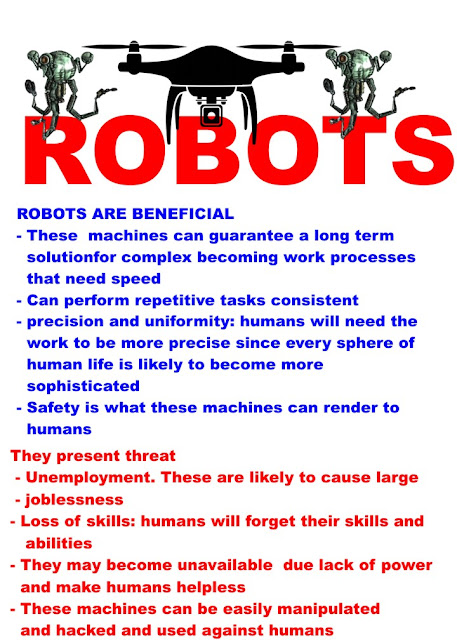Some
people think that robots are very important to human’s future development.
Others think that they are dangerous and have negative effects on society.
Discuss both opinions and give your personal view.
ROBOTS ARE BENEFICIAL FOR HUMAN’S FUTURE DEVELOPMENT
These machines can guarantee a long term solution for complex becoming work processes that need speed
Can perform repetitive tasks consistent
precision and uniformity: humans will need the work to be more precise since every sphere of human life is likely to become more sophisticated
Safety is what these machines can render to humans since these devices can even work in hazardous and those environment which are beyond the reach of mankind
economical: these machines are capable of working without needing extra overheads
They are dangerous and have negative effects on society.
- Unemployment. These are likely
to cause large joblessness
- Loss of skills: humans will
forget their skills and abilities
- They depend on an external
power source and if that does not become available due to some reasons,
humans will become helpless
- These machines can be easily
manipulated and hacked and used against humans
Despite robots ushering
in an era of ease and promises for the furtherance of progress in all spheres
of life, there is skepticism about the impact of these machines since certain perceptions
enumerate the hazards these could present to society.
There is optimism across several sections: artificial intelligence
can afford unprecedented speed and economy, and
the way the things are progressing, it is quite evident that future
progress will depend on how quickly jobs in manufacturing environment or in
services can be performed economically. These
devices are capable of working tirelessly without needing breaks and also without financial
stimulants. This aspect can ensure optimal productivity in all sectors.
Moreover, undeniably, precision is something one cannot discount
while using this apparatus. The future will depend on how precisely and
meticulously various undertakings can be negotiated. For instance, producing equipment,
even household, for use by humans that
is likely to become more sophisticated,
owing to its compact size, will be an onerous task for human workers; however,
the automated machines will be able to perform those flawlessly.
Nevertheless, those cynical fear that this will
jeopardize human life, and misery will descent in the form of rampant
unemployment, especially in the skilled trades, causing widespread poverty and economic
pressure of the state, for it will have to support jobless demographics. Additionally,
the attenuation of skills – even the basic - is another predicament which is
potential outcome, something mankind ill-afford. With these machines dominating
every sphere of work, people will find it hard to retain their knowhow.
Overall, although one can hardly deny the impediments
these computerized gadgets are going to erect, the fears are inappropriate
since progress cannot be halted on such pretext. Nonetheless, prudent steps will
need to taken to offset the unfavorable effects of such evolution.


